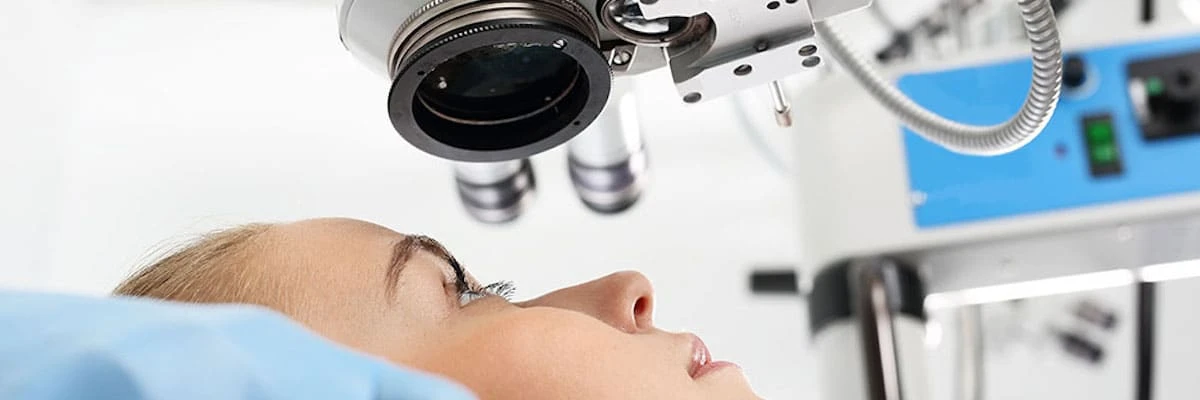PersonalEYES in Business in Focus Magazine
personalEYES | 17 Sep 2019

Freedom from Glasses and Contacts
Of all the senses we possess, one of the most valuable is our eyesight. It is also, paradoxically, one which many of us take for granted until we develop vision problems or find ourselves needing glasses to do everyday activities like read, watch television, or drive. Fortunately, many conditions can be corrected or treated, thanks to one of Australia’s most respected eye care centres.
Formed nearly five years ago, personalEYES Pty Ltd has the ability to offer clients the widest range of treatment options of any group or clinic within Australasia. ”We have a number of segments to our business,” says Dean Powrie, Chief Executive Officer at personalEYES. ”Number one is the fact we specialise in vision correction so that people don’t need to wear glasses or contacts – but we are a full-service ophthalmology group. We have a range of ophthalmology specialists, through from working with children, retina, macular degeneration, glaucoma, ocular plastics, and more.”
Involved in the medical industry for three decades, Mr Powrie trained in science, and has worked in a number of management roles for prestigious companies, such as Johnson & Johnson Medical in Australia. In the nineties, he was involved with pioneering laser-assisted in situ keratomileusis, better known as the Lasik procedure, an innovative type of laser eye surgery used to correct myopia, hyperopia, and astigmatism. A viable alternative to wearing eyeglasses or contact lenses, Lasik also allows for faster patient recovery. Prior to personalEYES, Mr Powrie was co-founder of a laser group in 1995, which was Australia’s largest laser vision correction network.
In Australia and many other nations, more and more people are turning to laser eye surgery to correct a number of vision problems such as myopia (near-sightedness), hyperopia (far-sightedness), astigmatism (distorted vision when looking at objects at any distance), and presbyopia (the inability to focus on nearby objects). Although many of these conditions and others are a normal part of aging and can be corrected with glasses or contact lenses, more of us are turning to laser eye surgery. The ones who stand to benefit the most are in their twenties, but the bulk of personalEYES patients choosing the procedure are Baby Boomers, men and women aged 45 to 50.
”With today’s competitive work environment, wearing reading glasses signals you’ve reached middle age, and a lot of Baby Boomers don’t like that,” says Mr Powrie. Treating an average of 20 to 40 patients every day at each of the company’s four clinics – along with four satellite clinics – Mr Powrie says other reasons for the surgery include, simply, no longer wishing to fumble for eyeglasses. Some patients in their 60s and 70s even undertake laser eye surgery as a way to reward themselves with better vision.
”Our position is, we want to find out what is the safest and best way to help someone not wear their glasses for the longest possible time,” comments Mr Powrie. In some cases, older individuals who wish to have the surgery show early beginnings of cataracts, and the staff will address the cataracts while at the same time providing prior vision correction or independence from glasses.”
Choosing to have eye treatment is an investment in your health now and into the future, and few centres realise this more than personalEYES. With a team of highly experienced, world-class surgeons who have performed over 10,000 laser eye surgery procedures over many years, personalEYES invests in its staff, along with state-of-the-art surgical facilities and advanced technologies to provide clients with the most current, safest, and personalised service possible.
”You need to re-invest in the lastest technology if you are going to provide the most effective and safest options for your clients,” says Mr Powrie, who emphasises that personalEYES provides a highly-skilled and advanced surgical service – not a product – and that laser vision correction must be treated seriously. Many of us have seen adverts for low-cost surgery, which should be treated with a degree of skepticism. ”Some other clinics offer an unusually low price, and they do that for two reasons only: one, they are either just starting out with inexperienced doctors and they’re trying to increase their volume, or two, they have all this old equipment they’ve paid off – there is always going to be some corner that’s cut. You pay for what you get. Some place advertising laser vision correction for $1,000 and clients believing it’s the same everywhere – that’s like saying all cars are the same.” At personalEYES, clients are paying not only for the surgeon’s high degree of skill, but for the advanced technology, equipment, safety measures, ongoing support, and the cumulative experience of staff in the clinic.
Although laser eye corrective surgery has existed for decades, Mr Powrie and his staff have witnessed many advances over the past 17 years, particularly with regard to how technology has grown more precise. In that time, the procedure has become safer and more predictable, and many people who couldn’t benefit in the past can now take advantage of the surgery.
”Today, we can help people who are not just short-sighted, but far-sighted, people with astigmatism, people who need glasses to read, people who have cataracts and don’t want to wear glasses for distance or for reading – you can help those people now.” Mr Powrie mentions one recent client – a well-known Australian celebrity – who was able to shed his eyeglasses thanks to personalEYES. ”He had two pairs of glasses which cost about $750 each, and at that price, it doesn’t take long to get a return on your investment if you’re not going to wear them, along with the freedom, convenience, comfort, appearance, and functionality that comes with not having to wear glasses.”
Recently, the company invested in Intracor (‘cor’ for cornea), a new type of laser that allows surgeons to perform bladeless vision correction. ”It’s a procedure that allows people not to wear glasses,” says Mr Powrie, and ”it’s the only one of its kind in Australasia, a $600,000 investment.” The surgery is performed under local anesthetic eyedrops. ”Someone can come in, have the procedure, and be back at his or her desk in two to three hours. There are no cuts, limited healing, and an improvement in their reading in two to three hours.”
Additionally, the company now performs bladeless cataract surgery called Laser Cataract now, which is not only safer and more precise than traditional surgery, but also offers faster visual recovery. ”Patients can be driving the next day and back at work, instead of taking four or five days.”
PersonalEYES also became the first in Australasia to invest in AcuTarget. Associated with a procedure called KAMRA, the technology allows personalEYES doctors to position treatment with a high degree of precision.
At personalEYES, the company has made the entire process – from assessment to follow-up after the surgery – as efficient as possible. Potential clients can request information by calling the company’s toll-free number at 1300 683 937 (1 300 NU EYES), or online at its website, www.personaleyes.com.au. There, clients can book a free, no obligation suitability assessment to examine and measure eyes and discuss the best options, request a free information pack on laser eye correction including DVD, meet the specialist team of surgeons, and find related information about vision correction.
”We have two types of people: those who are close to one of our clinics and can come in for a consultation, and those who come in from interstate or overseas,” says Mr Powrie. All potential clients have a thorough consultation to determine which procedure is going to be right for them. During the initial consultation, patients meet with a personalEYES qualified surgeon. The initial consultation takes about one to one and a half hours, and includes a review of the patient’s medical and ocular history, eye examination, a refraction and corneal pachymetry, and corneal topography measurements. Questions are answered during the consultation, which determines if the individual is a good candidate for laser vision correction. Options – along with benefits, risks and results – are also explained. Once a specific treatment is determined, a tentative time will be booked.
Many personalEYES clients come from places across Australia, and can have the treatment the day they arrive or the next day, stay one night, and return home. In almost all cases, it is not necessary for the patient to return, since follow-up appointments are conducted by the patient’s own doctor or optometrist in their hometown, with reports sent to personalEYES. In some cases, the company engages in live video feeds with some of its partnering doctors across Australia, and can send images and other information electronically as necessary.
Along with the latest technology and highly-trained specialists, CEO Dean Powrie says much of personalEYES’ success comes from having the right attitude. ”The defining difference in any business is customer service. It’s a given that our surgeons are going to do a good job. It’s a given that we have good technology. People expect these things, but the one defining difference is their experience. The most effective marketing, the most effective advertising you can get is word of mouth – that’s still the same [whether] in the medical business or a great restaurant – if someone comes in and they have a great experience, they’re going to tell everybody.”
This sense of empathy the company enjoys with its patients has carried over into other areas. The company is a proud supporter of several non-profit charities in Australia and overseas, and personalEYES physicians often travel to less fortunate countries to perform pro bono surgeries. ”I think it is very important to be a good steward to the community. If you’ve been blessed, and you’ve been successful, it is your duty to support the community and to give back. Our partners and our doctors are very involved and very generous,” says Mr Powrie of the company, which will soon be traveling to The Philippines and Madagascar to perform 100 to 200 surgeries.
Another way personalEYES gives back is by donating used eyeglasses to those in need. ”We offer a free post reply paid arrangement for people anywhere in Australia. They can send their old glasses back if they’ve had treatment with us or not, if they’ve updated their glasses and need new glasses.”
Once glasses have been received by the company, they are cleaned, tested to determine the prescription, labeled, and shipped to partnering charities. ”Some people can’t see well enough without glasses to do basic things, like cook their own meals. In some places, there is no optometrist for hundreds of kilometres. They can’t buy glasses.”
Mr Powrie is fond of a photo he keeps of an older man with an enormous smile on his face, captured just after he received a pair of donated glasses. ”You don’t have to do surgery to make a difference. Just being able to have a pair of glasses makes a huge difference. This is one of the things that has kept us going for 17 years: the satisfaction of actually making a difference.”
Business in Focus | by Robert Hoshowsky | Read article >



